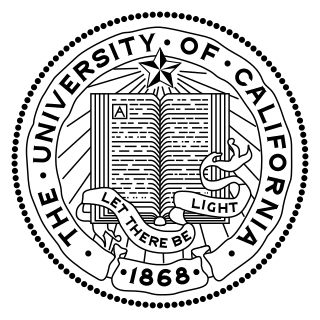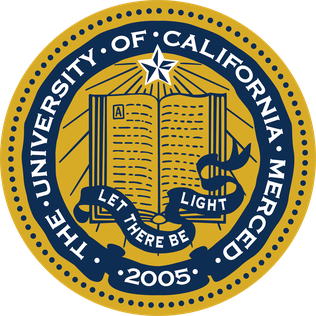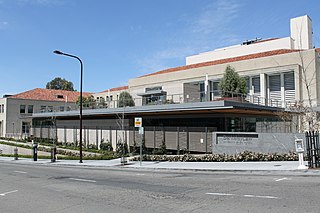Related Research Articles

The University of California (UC) is a public land-grant research university system in the U.S. state of California. Headquartered in Oakland, the system is composed of its ten campuses at Berkeley, Davis, Irvine, Los Angeles, Merced, Riverside, San Diego, San Francisco, Santa Barbara, and Santa Cruz, along with numerous research centers and academic abroad centers. The system is the state's land-grant university. Major publications generally rank most UC campuses as being among the best universities in the world. In 1900, UC was one of the founders of the Association of American Universities and since the 1970s seven of its campuses, in addition to Berkeley, have been admitted to the association. Berkeley, Davis, Irvine, Los Angeles, Santa Barbara, Santa Cruz, and San Diego are considered Public Ivies, making California the state with the most universities in the nation to hold the title. UC campuses have large numbers of distinguished faculty in almost every academic discipline, with UC faculty and researchers having won 71 Nobel Prizes as of 2021.

The University of California, Santa Cruz is a public land-grant research university in Santa Cruz, California. It is one of the ten campuses in the University of California system. Located on Monterey Bay, on the edge of the coastal community of Santa Cruz, the main campus lies on 2,001 acres (810 ha) of rolling, forested hills overlooking the Pacific Ocean. As of Fall 2022, its ten residential colleges enroll some 17,500 undergraduate and 2,000 graduate students. Satellite facilities in other Santa Cruz locations include the Coastal Science Campus and the Westside Research Park and the Silicon Valley Center in Santa Clara.

The University of California, Davis is a public land-grant research university in Davis, California, United States. It is the northernmost of the ten campuses of the University of California system. The institution was first founded as an agricultural branch of the system in 1905, known as University Farm, and became the seventh campus of the University of California in 1959.

The University of California, San Diego is a public land-grant research university in San Diego, California. Established in 1960 near the pre-existing Scripps Institution of Oceanography, UC San Diego is the southernmost of the ten campuses of the University of California, and offers over 200 undergraduate and graduate degree programs, enrolling 33,096 undergraduate and 9,872 graduate students. The university occupies 2,178 acres (881 ha) near the coast of the Pacific Ocean, with the main campus resting on approximately 1,152 acres (466 ha).
The Walter A. Haas School of Business is the business school of the University of California, Berkeley, a public research university in Berkeley, California. It was the first business school at a public university in the United States.

The University of California, Merced is a public land-grant research university in Merced, California. It is one of the ten campuses in the University of California (UC) system. Established in 2005, UC Merced is the newest campus within the UC system. The primary campus is located around five miles north of Merced and sits adjacent to Lake Yosemite. The main campus is around 1,026 acres in size, and total land owned by the university amounts to around 8,195 acres including large areas of preserve land. Large swaths of almond orchards and natural grasslands surround the university.

The University of California College of the Law, San Francisco is a public law school in San Francisco, California, United States. It was previously known as the University of California, Hastings College of the Law from 1878 to 2023.

El Plan de Santa Bárbara: A Chicano Plan for Higher Education is a 155-page document, which was written in 1969 by the Chicano Coordinating Council on Higher Education. Drafted at the University of California Santa Barbara, it is a blueprint for the inception of Chicana/o studies programs in colleges and universities throughout the US. The Chicano Coordinating Council expresses political mobilization to be dependent upon political consciousness, thus the institution of education is targeted as the platform to raise political conscious amongst Chicanos and spur higher learning to political action. The Plan proposes a curriculum in Chicano studies, the role of community control in Chicano education and the necessity of Chicano political independence. The document was a framework for educational and curriculum goals for the Chicano movements within the institution of education, while being the foundation for the Chicano student group Movimiento Estudiantil Chicano de Aztlán (MEChA).

The University of California, Los Angeles School of Law is the law school of the University of California, Los Angeles.

The University of California, Berkeley, School of Information, also known as the UC Berkeley School of Information or the I School, is a graduate school and, created in 1994, the newest of the schools at the University of California, Berkeley. It was previously known as the School of Information Management and Systems (SIMS) until 2006. Its roots trace back to a program initiated in 1918 which became the School of Librarianship in 1926 and, with a broader scope, the School of Library and Information Studies in 1976. The program is located in the South Hall, near Sather Tower in the center of the campus.
Sara Rose Diamond is an American sociologist and attorney, and the author of four books that "study and expose the agenda and tactics of the American political right wing."
The Institute of Transportation Studies (ITS) at the University of California's Berkeley, Davis, Irvine, and Los Angeles campuses are centers for research, education, and scholarship in the fields of transportation planning and engineering. Faculty members, staff researchers, and graduate students comprise this multidisciplinary institute network of more than 400 people, which administers an average of $20 million in research funds each year. ITS Berkeley is an organized research unit with nine affiliated organizations and an eight-member advisory council.
The University of California, Berkeley, contains many research centers and laboratories.

The University of California, Berkeley School of Law is the law school of the University of California, Berkeley. The school was commonly referred to as "Boalt Hall" for many years, although it was never the official name. This came from its initial building, the Boalt Memorial Hall of Law, named for John Henry Boalt. This name was transferred to an entirely new law school building in 1951 but was removed in 2020.
The Institute of Governmental Studies (IGS) is an interdisciplinary organized research unit at UC Berkeley, located in Philosophy Hall. It was founded in 1919 as the Bureau of Public Administration. IGS and its affiliated centers spearhead and promote research, programs, seminars and colloquia, training, educational activities and public service in the fields of politics and public policy, with a strong focus on national and California politics. Current IGS research focuses include institutional policy and design, political reform, term limits, campaign finance, redistricting, direct democracy, presidential and gubernatorial politics, representative government, the politics of race and ethnicity, immigration and globalization.
Academic bias is the bias or perceived bias of scholars allowing their beliefs to shape their research and the scientific community. It can refer to several types of scholastic prejudice, e.g., logocentrism, phonocentrism, ethnocentrism or the belief that some sciences and disciplines rank higher than others.

The UCLA Institute for Research on Labor and Employment (IRLE) is an interdisciplinary research unit within the College of Letters & Science, Division of Social Science, dedicated to research, teaching, and discussion of labor and employment issues. It was founded in 1945 as the UCLA Institute of Industrial Relations. It is one of the two research programs in the University of California system along with the UC Berkeley Institute for Research on Labor and Employment. The IRLE consists of four bodies: the IRLE Academic Unit, UCLA Labor Center, Human Resources Round Table, and the Labor Occupational Safety and Health Program.
Carole E. Joffe is an American sociologist and reproductive rights advocate who has published several books on abortion. In 2013, she was awarded the Society of Family Planning Lifetime Achievement Award for her research on the sociology of abortion and family planning. She has also earned the UC Davis Public Service Award (2006), the Irwin Kushner Lecture by the Association of Reproductive Health Professionals (2010), and the David Gunn Lifetime Achievement Award from the Abortion Care Network (2015). Joffe serves on the faculty advisory board of the Berkeley Center for Right-Wing Studies.
Alliance of Libertarian Activists (ALA) was a libertarian student organization primarily located in the San Francisco Bay area, mostly active at University of California, Berkeley, established in 1965–1966, and considered the first campus group to adopt the term “libertarian.” ALA gained members from both the purged Young Americans for Freedom (YAF) Moïse Tshombe chapter and the Cal Conservatives for Political Action (CCPA) at UC Berkeley, which was a continuation of the 1964 Cal Students for Goldwater, both founded and first chaired by Dan Rosenthal.

The anti-gender movement is an international movement that opposes what it refers to as "gender ideology", "gender theory", or "genderism", terms which cover a variety of issues, and do not have a coherent definition. Members of the anti-gender movement are largely on the right-wing and far-right political spectrum, such as right-wing populists, social conservatives, and Christian fundamentalists. It has been linked to a shift away from liberal democracy and towards right-wing populism. Anti-gender rhetoric has seen increasing circulation in trans-exclusionary radical feminist (TERF) discourse since 2016. Different members of the anti-gender movement variously oppose some LGBT rights, some reproductive rights, government gender policies, gender equality, gender mainstreaming, and gender studies academic departments. The Canadian Security Intelligence Service has linked the anti-gender movement to the risk of "extreme violence" against the LGBTQI+ community. UN Women has described the anti-gender, gender-critical and men’s rights movements as extreme anti-rights movements that "use hateful propaganda and disinformation to target and attempt to delegitimize people with diverse sexual orientations, gender identities, gender expressions, and sex characteristics."
References
- 1 2 3 4 5 6 "About CRWS | Institute for the Study of Societal Issues". About CRWS. Retrieved 9 April 2024.
- 1 2 3 Cohen, Patricia (25 March 2009). "New Political Study Center? Turn Right at Berkeley". New York Times. Retrieved 9 April 2024.
- 1 2 "CRWS Research | Institute for the Study of Societal Issues". CRWS Research. Retrieved 9 April 2024.
- 1 2 3 "About JRWS". Berkeley Journal of Right-Wing Studies. Retrieved 9 April 2024.
- ↑ Edsall, Thomas B. (3 April 2024). "Opinion: Trump's Backers Are Determined Not to Blow It This Time Around". New York Times. Retrieved 9 April 2024.
- ↑ Galloway, Kayla (14 January 2021). "'Markers were not sudden': US Capitol riot not surprising, chair of UC Berkeley's Center for Right-Wing Studies says". ABC. Retrieved 9 April 2024.
- 1 2 3 Zhang, Phil (8 May 2018). "'Our mission is scholarship': Berkeley Center for Right-Wing Studies brings academic lens to conservative movements". The Daily Californian. Retrieved 9 April 2024.
- 1 2 "CRWS Archives" . Retrieved 9 April 2024.
- ↑ "CRWS People". CRWS People. Retrieved 9 April 2024.